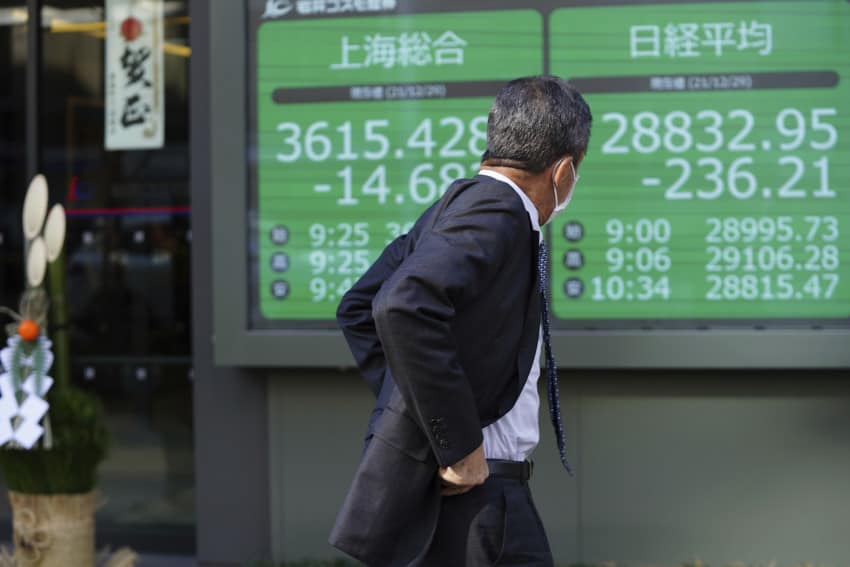Asian shares mostly slipped Wednesday, as worries lingered about the coronavirus Omicron variant’s potential damage to the regional economy following mixed cues from Wall Street.
Japan’s benchmark Nikkei 225 lost 0.6% to finish at 28,906.88. South Korea’s Kospi slipped 0.9% to 2,993.29, while Australia’s S&P/ASX 200 jumped 1.2% to 7,509.80. Hong Kong’s Hang Seng dropped 1.1% to 23,033.49, and the Shanghai Composite shed 0.9% to 3,597.00.
Although Asia has relatively few reported infection cases of the Omicron variant compared to the U.S. and Europe, fears are growing that Omicron will spread quickly once it gets going. The vaccination rate is about 80% in Japan, but booster shots have barely gotten started.
“The wider point is that regardless of how ‘variant risks’ play out, the process of emerging from the COVID tunnel will be fraught with more heat than light,” meaning problems such as “impediments to unfettered global travel,” which will hobble any recovery, Vishnu Varathan of Mizuho Bank said in a report.
Wall Street had a wobbly day of trading that pulled the S&P 500 just below its latest record high. The benchmark index slipped 0.1% after wavering between modest gains and losses. The slight loss snapped a four-day winning streak for the index, which set an all-time high on Monday. The Dow Jones Industrial Average rose 0.3% and the Nasdaq fell 0.6%.
Roughly 60% of the companies in the S&P 500 rose, but a slide in technology, health care and communication stocks outweighed gains in industrial firms, household goods makers and elsewhere in the market. Small company stocks also fell, pulling the Russell 2000 index 0.7% lower.
“We did have four straight days of upward movement,” said Sam Stovall, chief investment strategist at CFRA. “Investors are keeping their fingers tightly crossed that we will end up with a positive ‘Santa Claus’ rally.”
That’s what Wall Street calls a rally in the final five days in December and the first two trading days in January. Since 1950, the S&P 500 index has risen an average of 1.3% during those seven days. If the “Santa rally” doesn’t arrive, some traders see it as an omen that stocks may fall in the upcoming year.
The S&P 500 slipped 4.84 points to 4,786.35. The Dow rose 95.83 points to 36,398.21. The tech-heavy Nasdaq dropped 89.54 points to 15,781.72. The Russell 2000 gave up 14.95 points to 2,246.51.
The major U.S. stock indexes are on pace to close out 2021 with strong gains. The S&P 500 is up 27.4% with three trading days to go this year.
Technology companies, which did well on Monday, led the decliners in the S&P 500. Graphics chip maker Nvidia fell 2%.
Health care and communication services stocks also weighed on the market. Pfizer fell 2% and Moderna dropped 2.2%. Twitter fell 2%.
Industrial companies and household goods makers were among the better performers. Boeing added 1.5% and Campbell Soup rose 2.8% for the biggest gain in the S&P 500.
Airline stocks recovered some of their losses from this month. American Airlines rose 2%, United Airlines gained 1.5% and Delta Air Lines closed 1.6% higher.
Much is still uncertain about Omicron, which is spreading extremely quickly and leading to a return to pandemic restrictions in some places. The variant is quickly becoming the dominant strain throughout the world. While virus-related lockdowns and travel restrictions remain a big concern, most big investors have closed out their positions for 2021 and are likely to hold their ground until next week.
In energy trading, benchmark U.S. crude lost 8 cents to $76.05 a barrel from $75.98. Brent crude, the international standard, added 13 cents to $79.07 a barrel.
In currency trading, the U.S. dollar fell to 114.90 Japanese yen from 114.81 yen. The euro cost $1.1303, down from $1.1313.

